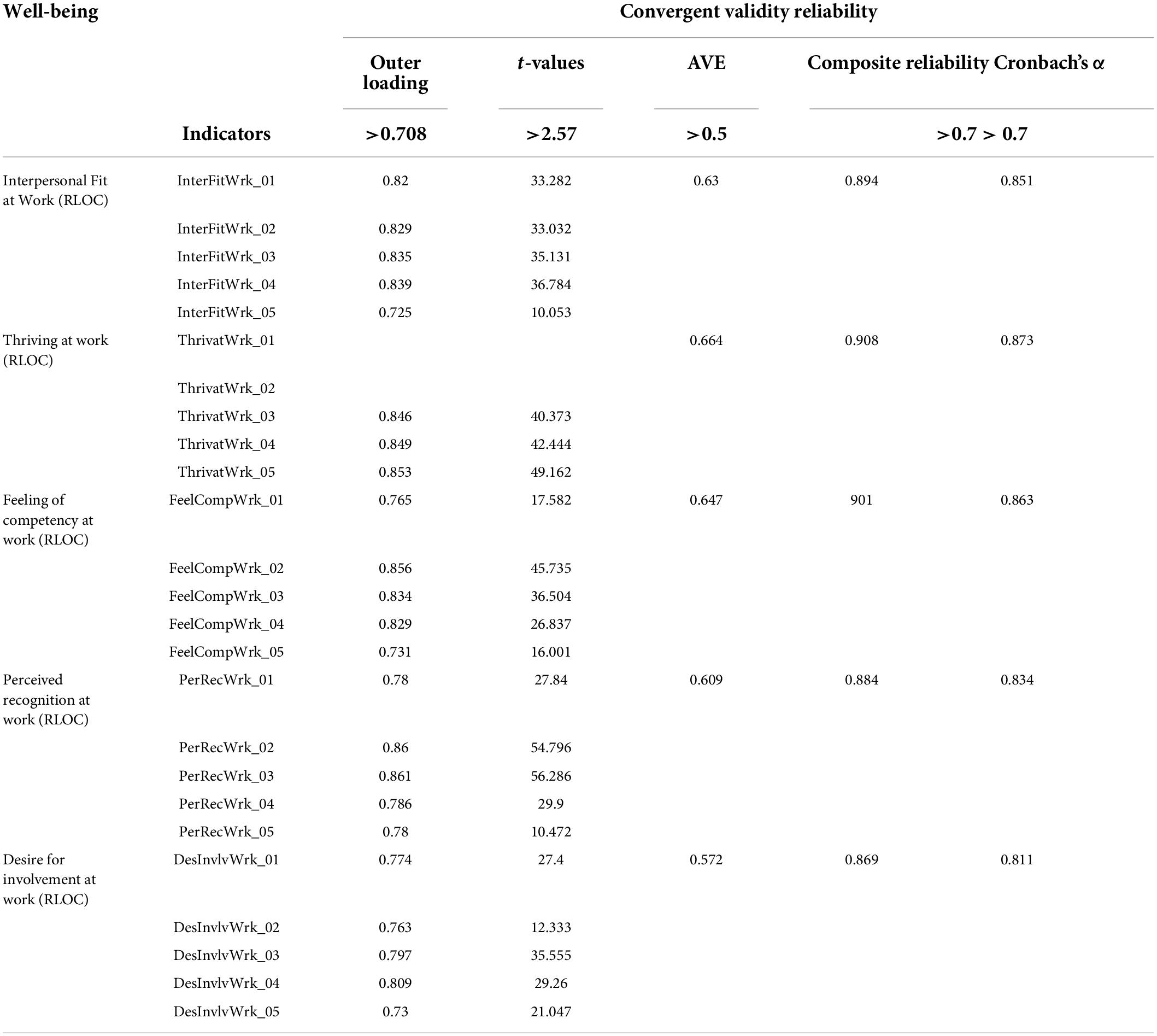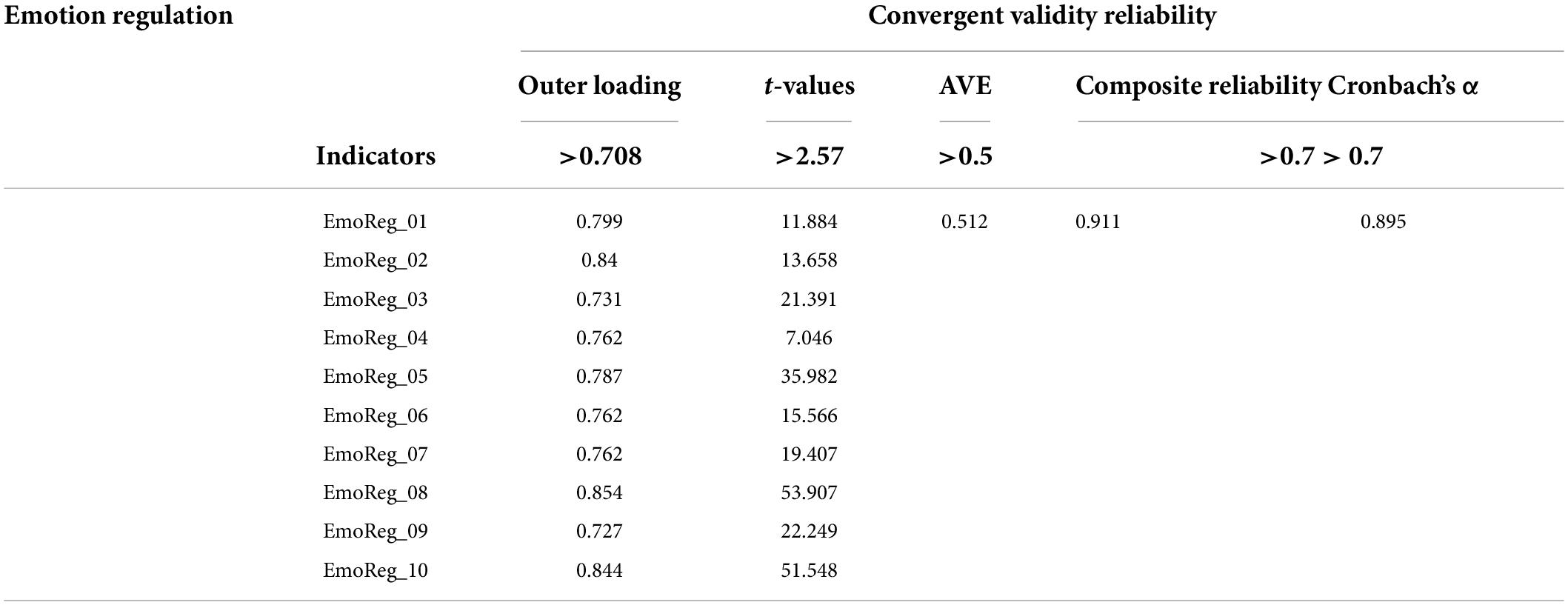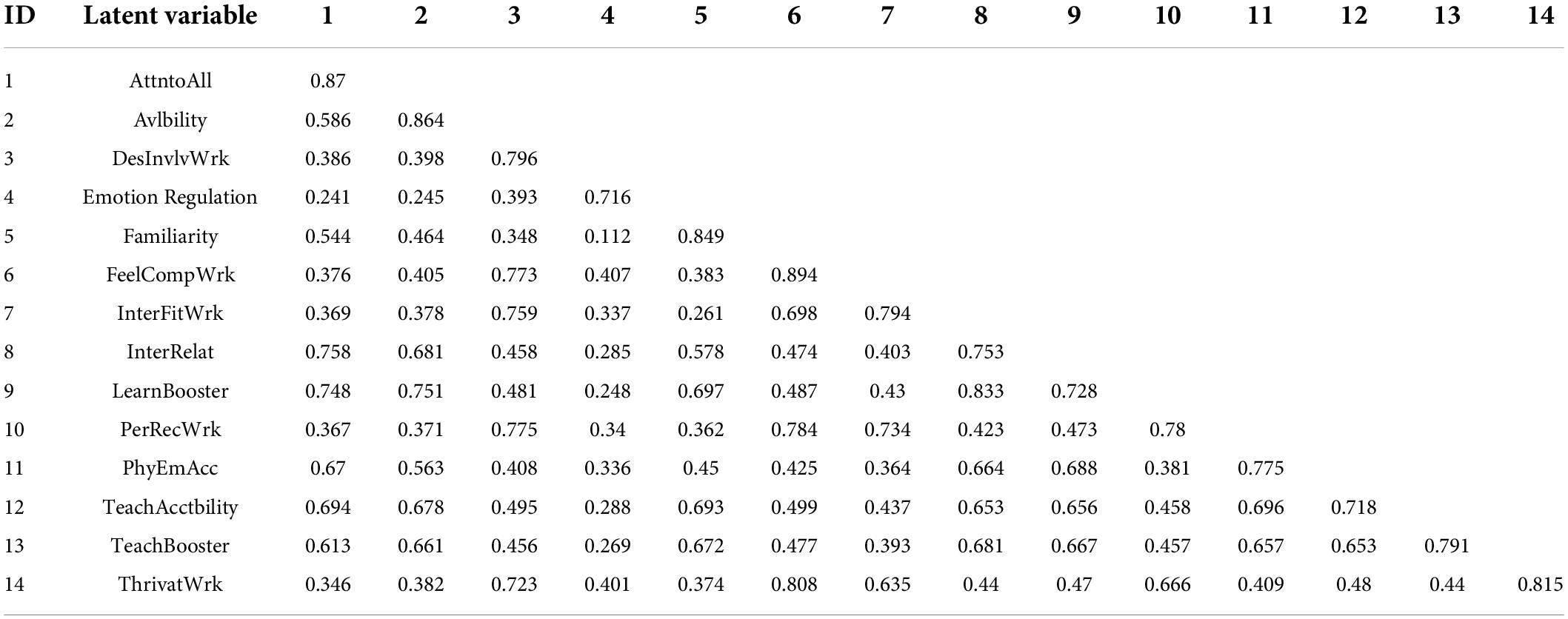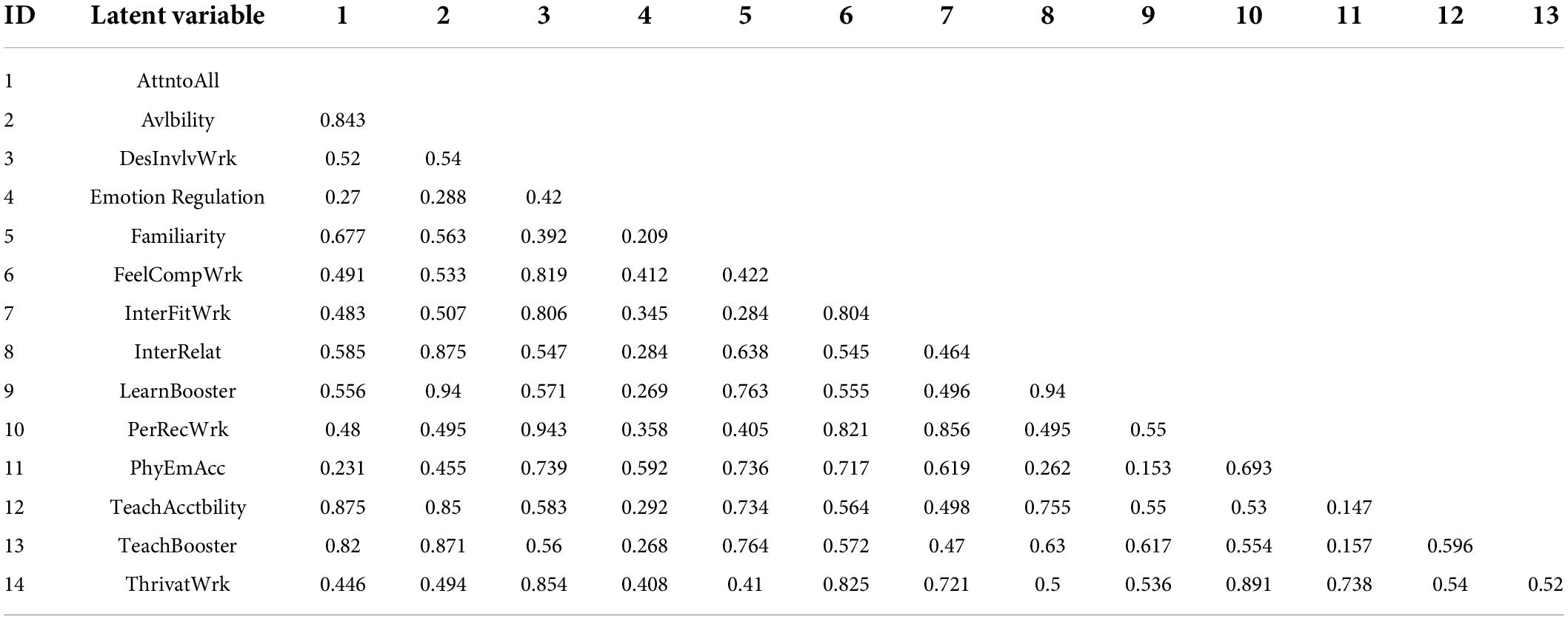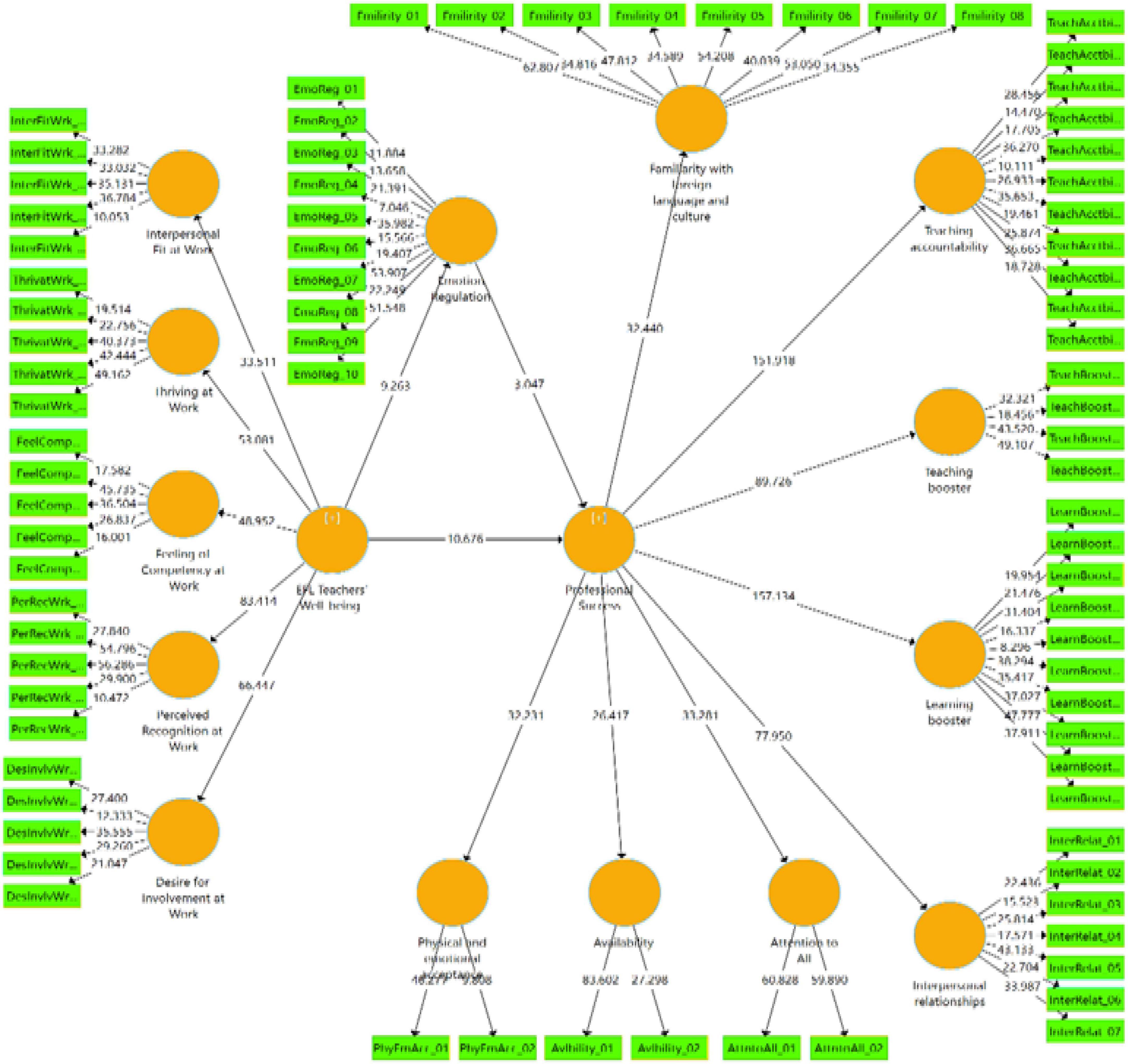- 1School of College English Teaching and Research, Henan University, Kaifeng, China
- 2School of Liberal Arts, Shinawatra University, Pathum Thani, Thailand
Given the significance of teachers’ professional success in the adequacy of education, exploring the determinants of this variable appears crucial. To address this need, this inquiry inspected the role of well-being and emotion regulation in Chinese EFL teachers’ professional success. For this purpose, 357 Chinese EFL teachers were selected to answer three pre-designed questionnaires. Structural equation modeling (SEM) using Smart-PLS was implemented to analyze teacher participants’ responses. The structural model revealed a strong, favorable connection between well-being, emotion regulation, and professional success. The model also demonstrated that both well-being and emotion regulation were highly influential in Chinese EFL teachers’ professional success. The potential implications for EFL teachers, teacher educators, and educational authorities are further discussed.
Introduction
Teachers are believed to be the main pillars of education in any instructional-learning environment, including English classes. It means that the success or failure of educational systems highly depends on teachers’ professional performance (Wang, 2017; Coombe, 2019). Put it differently, teachers’ professional success is the key to a successful educational system. The concept of teacher professional success, also known as teacher effectiveness, generally refers to the degree to which teachers meet the instructional objectives set by themselves or educational administrators (Dordinejad and Porghoveh, 2014; Wossenie, 2014). More specifically, “English as a foreign language (EFL)” teachers’ professional success pertains to the extent to which an EFL teacher is successful at transmitting English language knowledge/skills to his or her pupils (Coombe, 2014). Successful teachers, according to the “American Association of School Administrators (AASA),” are those who effectively teach the course content, manage the classroom atmosphere, and fulfill students’ academic needs (Pishghadam et al., 2019).
Given that successful teachers are the cornerstone of any effective educational system and the key to obtaining desired learning outcomes (Zhao et al., 2016; Coombe, 2019), factors contributing to teachers’ professional success need to be studied. To give an appropriate response to this necessity, many scholars have investigated the role of personal factors, including identity (Derakhshan et al., 2020a), autonomy (Nosratinia and Zaker, 2017; de Groot-Reuvekamp et al., 2018), creativity (Khodabakhshzadeh et al., 2018), and self-efficacy (Klassen and Tze, 2014; Fathi et al., 2021) in teacher professional success. Likewise, many scholars have explored the function of interpersonal factors, namely immediacy (Nayernia et al., 2020), stroke (Pishghadam et al., 2021a), and credibility (Pishghadam and Karami, 2017) in teacher effectiveness. The role of emotions and emotional factors, on the other hand, has been overlooked. To cast more light on the role of positive emotional variables in teachers’ professional success, the current investigation attempts to assess the role of well-being and emotion regulation in Chinese EFL teachers’ professional success.
Well-Being, as a positive emotional characteristic, broadly refers to the presence of favorable emotions such as joy, satisfaction, and happiness (Garg and Rastogi, 2009). Accordingly, teachers’ well-being pertains to the degree to which they are fulfilled, happy, and cheerful in classroom settings (Wong and Zhang, 2014). As put forward by Granziera et al. (2020), teachers’ well-being is subjective to their workplace and working conditions. In this regard, McCallum (2020) articulated that the behaviors of colleagues, administrators, and students, along with the workplace atmosphere, can dramatically influence teachers’ subjective and psychological well-being. Likewise, Dreer (2022) stated that supportive working conditions help teachers attain higher levels of well-being. According to Mercer et al. (2016), instructors who enjoy an optimal level of well-being can thrive in their vocation. It implies that the absence of negative emotions (e.g., anxiety, job-related stress, apprehension, dissatisfaction) is the key to teachers’ professional success (Collie et al., 2015).
Emotion regulation, as another emotional characteristic, refers to one’s capacity to manage his/her emotional experiences (Thompson et al., 2008). More specifically, teachers’ emotion regulation pertains to individual teachers’ ability to handle the positive and negative emotions they typically experience in educational contexts (Gong et al., 2013). Teachers in any instructional-learning environment experience a wide variety of positive and negative feelings (Xie, 2021): Joy when learners fully understand the course content, satisfaction when learners get high scores in their exams, disappointment at learners’ disengagement, and exhaustion when colleagues and administrators are not supportive enough. As Greenier et al. (2021) maintained, those teachers who can down-regulate the negative feelings and up-regulate the positive ones are more likely to flourish in their careers. According to Jiang et al. (2016), regulating emotional experiences empowers teachers to create a joyful atmosphere in their classes, which is critical for learners’ academic growth.
The prominent function of positive emotions in the adequacy and quality of teaching has been widely emphasized in general education (Zhang and Zhang, 2013; Li et al., 2020). Likewise, with the arrival of “positive psychology (PP)” in the language education domain, the value of positive emotions and positive emotional variables in improving teaching effectiveness has been relatively recognized (MacIntyre, 2016). The school of positive psychology, as Seligman (2019) mentioned, is centered on the pillars of “positive institutions,” “positive emotional characteristics,” and “positive experiences.” Among them, positive emotional characteristics, including but not limited to emotion regulation and well-being, can result in teachers’ flourishment, professional development, and success (Dewaele et al., 2019; MacIntyre, 2021; Wang and Derakhshan, 2021; Sun et al., 2022). It is argued that positive emotional characteristics enable teachers to come up with novel and creative ideas that are highly influential in their professional success (Wang and Guan, 2020; Wang et al., 2021). In line with this, Bardach et al. (2022) stated that successful and unsuccessful instructors vary on certain emotional characteristics. That is, those who possess positive emotional characteristics like well-being and emotion regulation are more likely to become successful in the teaching profession. Notwithstanding, the impact of these two emotional characteristics (i.e., well-being and emotion regulation) on teachers’ professional success has been disregarded by educational researchers. That is, limited attention has been dedicated to examining the consequences of well-being and emotion regulation for teachers’ effectiveness (Simbula et al., 2012; Rüppel et al., 2015; Zaki, 2018). Further, with respect to the existing literature, no empirical investigation has been devoted to the influences of these variables on teachers’ success in English language classes. To take a step toward narrowing the gaps, this inquiry seeks to assess the role of well-being and emotion regulation in Chinese EFL teachers’ professional success. The following questions guided the present inquiry:
1. Are there any significant correlations between Chinese EFL teachers’ well-being, emotion regulation, and professional success?
2. Do well-being and emotion regulation significantly predict Chinese EFL teachers’ professional success?
Literature review
Well-Being
The notion of well-being generally refers to “an individual’s degree of happiness and satisfaction with his/her life, career, and physical and mental health” (Garg et al., 2014, p. 265). Narrowing this to the educational context, Skaalvik and Skaalvik (2018) defined teacher well-being as the level of happiness, joy, and happiness teachers experience at work. Similarly, Gregersen et al. (2020) referred to teacher well-being as an individual teacher’s appraisal of his or her contentment in classroom contexts. There appears to be a dispute among academics on the fundamental components of teacher well-being. Ryff (1989), for instance, grouped the components of teacher well-being under seven dimensions (e.g., self-acceptance, positive relations with others, personal growth, among others). Dagenais-Desmarais and Savoie (2012), on the other hand, characterized this construct as comprising five core facets of “Interpersonal fit at work,” “Thriving at work,” “Feeling of competency at work,” “Perceived recognition at work,” and “Desire for involvement at work.” As put forward by Dagenais-Desmarais and Savoie (2012), “Interpersonal fit at work” as the first facet of teacher well-being deals with an individual teacher’s appraisal of his/her interactions with learners, colleagues, and administrators. The second dimension, “Thriving at Work,” is concerned with teachers’ perceptions of teaching as a desirable career in which they may flourish. The third facet, “Feeling of competency at work” has something to do with teachers’ assessment of their instructional knowledge. The fourth facet, “Perceived recognition at work,” relates to the degree to which administrators, learners, and parents appreciate teachers’ educational endeavors. Finally, “Desire for involvement at work,” as the name speaks for itself, refers to teachers’ inclination to devote themselves to their vocation.
To date, a multitude of studies has been done on teacher well-being and its academic consequences (e.g., Ergün and Dewaele, 2021; Kong, 2021, to cite a few). Ergün and Dewaele (2021), for instance, explored the effects of teachers’ well-being on teaching enjoyment. To accomplish this, 174 English language teachers were selected to answer two pre-designed questionnaires. The results of regression analysis uncovered that teachers’ well-being can desirably influence their enjoyment at work. In another study, Kong (2021) assessed the impact of well-being on teachers’ involvement in Chinese English classes. To do this, two scales were virtually administered to 304 EFL teachers. Considering the path analysis outcomes, the researchers reported that Chinese English teachers’ involvement is subjective to their well-being.
Emotion regulation
Emotion regulation refers to “extrinsic and intrinsic processes that an individual goes through to evaluate, modify, or control his/her emotions to accomplish specific purposes and goals in life” (Thompson, 2008, p. 27). In an educational setting, emotion regulation refers to the various physical, psychological, and cognitive processes that instructors use to up/down-regulate their emotions in order to carry out their job-related responsibilities (Gong et al., 2013). As Karabay (2019) mentioned, teachers who effectively demonstrate positive feelings and mitigate the negative ones can make a close bond with their learners. In this regard, Littleton (2021) also maintained that instructors who skillfully navigate their emotions can effectively communicate with pupils both inside and outside the classrooms. In a similar vein, Talbot and Mercer (2018) articulated that surpassing negative feelings such as anger, exhaustion, and apprehension empowers teachers to shield themselves against any threat to their professional success.
So far, a plethora of investigations has been implemented on emotion regulation and its possible academic outcomes (e.g., Braun et al., 2020; Chang, 2020; Han et al., 2020; Bing et al., 2022, among others). In their study, Han et al. (2020) evaluated the effects of instructors’ emotion regulation on their well-being. In doing so, 643 university instructors were invited to complete two reliable questionnaires. Data analysis showed a direct association between emotion regulation and well-being. Moreover, university instructors’ emotional regulation was found to be highly beneficial for their well-being. Similarly, Braun et al. (2020) probed the function of teachers’ emotion regulation in students’ well-being. For this goal, two scales were administered among 320 elementary learners and 15 teachers. The results indicated that teachers’ emotion regulation can favorably contribute to learners’ well-being.
Teacher professional success
Teacher professional success, also called an occupational success, broadly refers to the extent to which teachers function effectively in the workplace (Hung et al., 2007; Elizabeth et al., 2008). According to Derakhshan et al. (2020b), successful teachers are knowledgeable, principled, and skillful people who present information clearly, employ novel instructional techniques and use a variety of instructional aids. However, as Bremner (2020) noted, the qualities of effective/successful teachers are not limited to their instructional performance. To him, an effective teacher is someone who provides learners with a joyful learning environment, cares about their well-being, prioritizes their academic interests, and develops intimate connections with them. As Zhao et al. (2016) noted, a successful language teacher is competent and skilled enough to remarkably influence students’ learning outcomes and lead them toward academic success. In this regard, Pishghadam et al. (2021b) also articulated that learners’ L2 success depends largely upon the effectiveness of their instructors in that only effective instructors can inspire their pupils to attend the classes and pursue the arduous process of language learning. To them, teachers’ effectiveness, or professional success prompts language learners to survive and thrive in classroom contexts.
A review of existing literature reveals that EFL teachers’ professional success is tied to student achievement (Wossenie, 2014), student attendance (Gershenson, 2016), and student WTAC (Pishghadam et al., 2021a). Accordingly, exploring the predictors of teacher professional success is crucial. Against this backdrop, several research studies have been executed in EFL contexts to uncover the role of personal and interpersonal factors in teachers’ success (e.g., Klassen and Tze, 2014; Derakhshan et al., 2020b; Bardach et al., 2022, among others). Yet, the function of emotional factors in improving teacher effectiveness has remained elusive. To respond to this lacuna, this study seeks to assess the role of two emotional factors, namely emotion regulation and well-being, in Chinese EFL teachers’ professional success.
Methodology
Participants
The participants included 357 EFL teachers who were teaching English at different educational institutions in nine provinces of China (i.e., Anhui, Zhejiang, Jiangsu, Guizhou, Jiangxi, Guangdong, Shandong, Hubei, and Henan). The sample, chosen through a convenience sampling technique, comprised 60 males (16.81%) and 297 females (83.19%), ranging in their age from 22 to 58 (M = 38.7, SD = 7.95). Most teachers were greatly experienced, with teaching experience varying from 5 to 30 years. All participants had graduated in different branches of English, including “Teaching English as a Second Language (TESL)” (47.1%), “English Language Literature” (19%), “Applied Linguistics” (15.4%), “English Language Translation” (8.9%), “Linguistics” (2%), and the rest (7.6%). As regards their academic degrees, they hold bachelor’s degrees (N = 93) or above (N = 264). Following the ethical guidelines for educational research (British Educational Research Association [BERA], 2018), the confidentiality of demographic information was guaranteed to participants.
Instruments
Teacher well-being at work
The scale of “Teacher Well-Being at Work (TWBW),” validated by Dagenais-Desmarais and Savoie (2012), was used to assess Chinese teachers’ well-being in EFL classes. The TWBW encompasses five major components, including “Interpersonal Fit at Work,” “Thriving at Work,” “Feeling of Competency at Work,” “Perceived Recognition at Work,” and “Desire for Involvement at Work.” The scale is comprised of 25 items, the responses to which can vary from 0 (disagree) to 5 (entirely agree). Sample items involve “I like my job,” “I feel confident at work,” and “I am proud of the job I have.” In this research, a reliability index of 0.95 was reported for TWBW.
Emotion regulation questionnaire
The “Emotion Regulation Questionnaire (ERQ)” (Gross and John, 2003) was employed to measure how efficiently Chinese EFL teachers employ emotion regulation strategies in classrooms. This 10-item scale includes two main facets, namely “Cognitive Reappraisal” (6 items) and “Expressive Suppression” (4 items). The ERQ is a 7-point Likert-type scale, varying from 1 (strongly disagree) to 7 (strongly agree). Sample items encompass “I keep my emotions to myself,” and “I control my emotions by not expressing them.” The ERQ enjoyed high internal consistency in this study (α = 0.89).
Characteristics of successful English as a foreign language teachers questionnaire
Chinese EFL teachers’ professional success was evaluated by “Characteristics of Successful EFL Teachers Questionnaire (CSTQ)” (Moafian and Pishghadam, 2009). The CSTQ involves 47 items, measuring teachers’ professional success based on their “teaching accountability” (7 items), “interpersonal relationships” (7 items), “attention to all” (5 items), “examination” (3 items), “commitment” (3 items), “learning boosters” (6 items), “creating a sense of competence” (4 items), “teaching boosters” (4 items), “physical and emotional acceptance” (2 items), “empathy” (2 items), “class attendance” (2 items), and “dynamism” (2 items). The teachers rated the items on a 5-point Likert scale, from 1 (strongly disagree) to 5 (strongly agree). The reliability of CSTQ in the present study was reported to be 0.97.
Data collection procedure
Before commencing the data collection, the participants were notified of the academic purposes of this inquiry. They were also informed that their participation in this research was entirely optional. Additionally, the consent forms were administered to participants through WeChat messenger. Then, to initiate the data collection process, three reliable self-report questionnaires (i.e., TWBW, ERQ, and CSTQ) were virtually distributed among 357 EFL teachers, using email and WeChat messenger. It took the researchers around a month to gather the participants’ responses.
Data analysis procedure
In this investigation, the gathered data was initially screened to detect and remove problematic and erroneous answers. Then, the internal consistency of the questionnaires was computed using composite reliability and Cronbach’s alpha procedure. Subsequently, the discriminant validity of the lower order constructs was also calculated through Fornell-Larcker and HTMT tests. Additionally, SEM using Smart-PLS (version 3.3.5) was performed to assess the interrelationships of the constructs (i.e., emotion regulation, well-being, and professional success) and the function of emotion regulation and well-being in Chinese EFL teachers’ professional success. SEM is one of the innovative methods of analysis in quantitative inquiries. As has been indicated by Novikova et al. (2013, p. 146), SEM has two major advantages over traditional multivariate methods: “explicit assessment of measurement error” and “estimation of latent variables via observed variables.” As to the first advantage of SEM analysis, Byrne (2013) stated that most multivariate methods unintentionally disregard measurement error, while SEM models assess these error variance parameters for both dependent and independent variables. Moreover, concerning the second advantage of this innovative method, he explained that SEM allows for the estimation of unobserved variables from observed variables.
Results
Before commencing the main analysis, teachers’ responses to the questionnaires were carefully reviewed to uncover and eliminate the problematic data. Fortunately, no missing responses were discovered in the collected data. Then, the patterns of gathered responses were examined. As a result, eight responses (No. 9, 15, 23, 55, 73, 110, 181, and 192) with persistence/decreasing/increasing patterns were recognized and eliminated. Following that, the standard deviations of participants’ responses were measured, and four responses with values less than 0.5 were removed. Finally, 345 responses were remained for the main analysis.
In the first phase of the main analysis, the Cronbach’s alpha and composite reliability were computed to evaluate the reliability of well-being, emotion regulation, and teacher professional success. The outcomes demonstrated that all variables enjoyed a high degree of reliability, with a Cronbach’s alpha and a composite reliability value above 0.7 (see Tables 1–3).
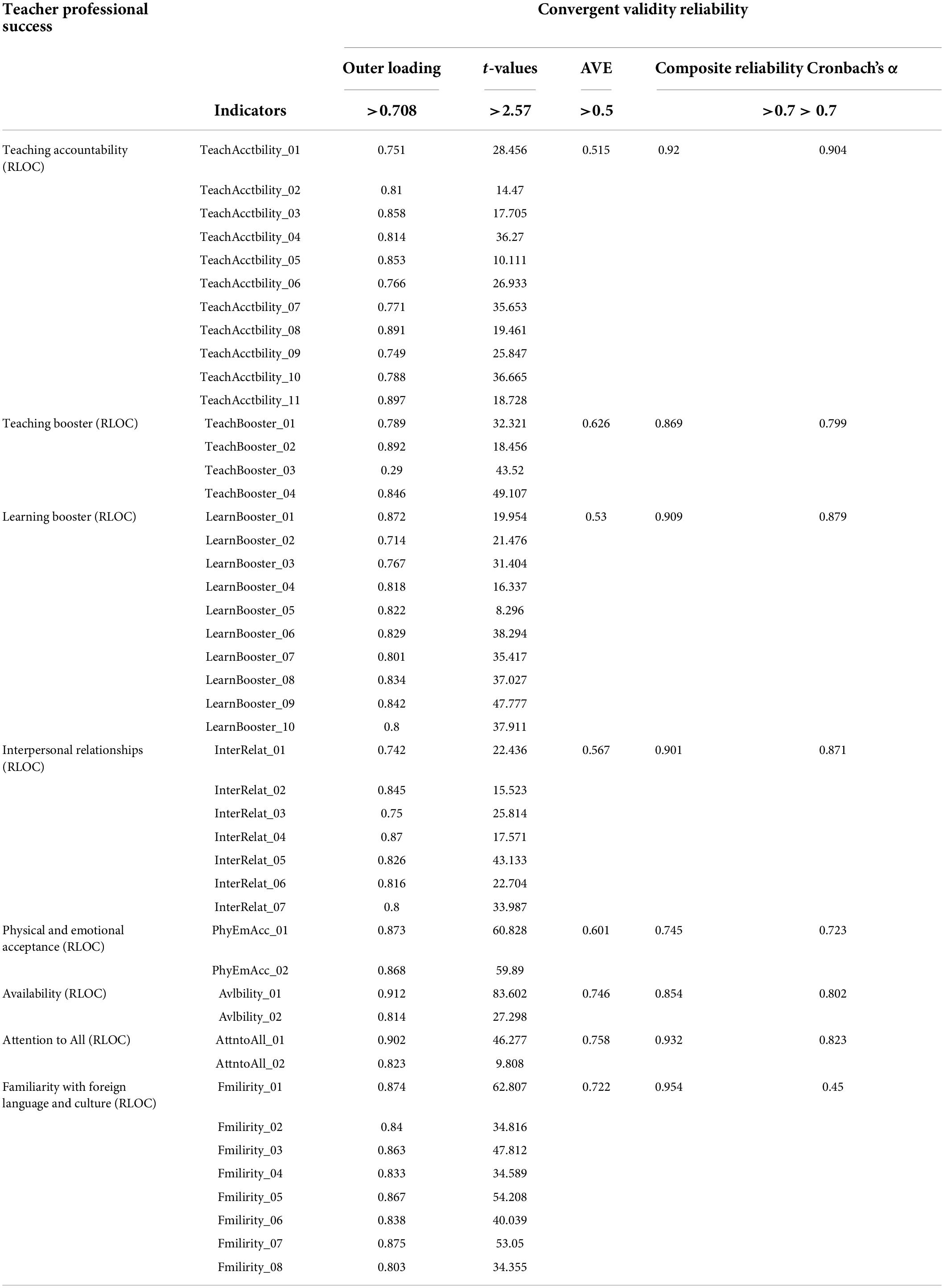
Table 3. Cronbach’s alpha, composite reliability, and convergent validity of teacher professional success.
In the second phase, Fornell-Larcker and HTMT tests were performed to measure the discriminant validity of the lower-order constructs. The results of the tests indicated that the square root of “average variance extracted (AVE)” for each construct was greater than the associations of the constructs (see Tables 4, 5). This confirms the discriminant validity of the lower-order constructs (Fornell and Larcker, 1981).
Additionally, to assess the associations between well-being, emotion regulation, and professional success and to analyze the role of well-being and emotion regulation in Chinese EFL teachers’ professional success, SEM was implemented through the Smart-PLS. The structural model of relationships between well-being, emotion regulation, and teacher professional success is portrayed in Figure 1.
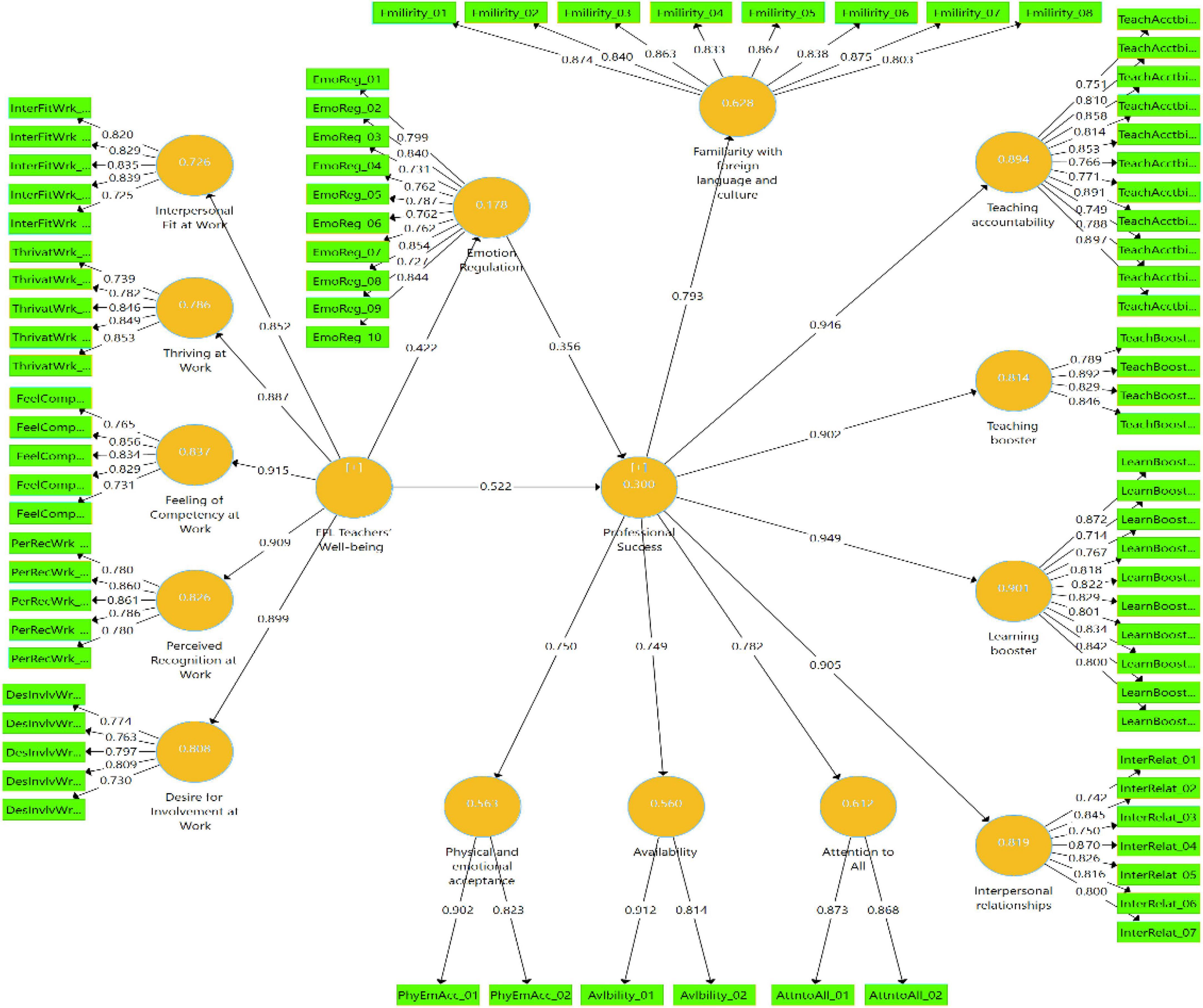
Figure 1. The structural model of the relationships between well-being, emotion regulation, and teacher professional success.
Finally, through Smart-PLS software, bootstrapping was performed to assess the structural model (Figure 2). The results of testing the structural model are fully presented in Table 5.
As presented in Table 6, well-being was favorably associated with teachers’ professional success (r = 0.300). Likewise, emotion regulation was tied to teachers’ professional success (r = 0.300). Moreover, a direct, positive relationship was also discovered between well-being and emotion regulation (r = 0.278). Finally, as Figure 1 demonstrated, both well-being (β = 0.522, t = 10.676, p < 0.001) and emotion regulation (β = 0.256, t = 3.047, p < 0.001) were found to be highly influential in Chinese EFL teachers’ professional success.
Discussion
The present research set out with the aim of assessing the associations between Chinese EFL teachers’ emotion regulation, well-being, and professional success. Simply said, this study aimed to inspect the degree to which the constructs are interrelated. Furthermore, this inquiry was aimed at evaluating the impacts of Chinese EFL teachers’ well-being and emotion regulation on their professional success. In fact, the present study was carried out to determine whether well-being and emotion regulation can influence teachers’ professional success in Chinese EFL classes.
As to the primary objective of this inquiry, the results of analyses revealed a direct, favorable connection, first, between well-being and professional success, and second, between emotion regulation and professional success. Additionally, a positive link was discovered between well-being and emotion regulation. The result of this study regarding the positive association between well-being and teacher professional success lends support to what Mercer et al. (2016) have argued in this regard. They articulated that teachers’ flourishment in educational settings is tied to their subjective and psychological well-being. This finding is also consistent with the ideas of Collie et al. (2015), who asserted that in the absence of negative feelings such as stress, apprehension, dissatisfaction, teachers are more likely to succeed in the teaching profession. Regarding the interrelationship between emotion regulation and teacher professional success, it is worth noting that this outcome agrees with the ideas of Greenier et al. (2021), who suggested that teachers’ occupational success is linked with their capacity to regulate the emotions up/down. Finally, the positive link between well-being and emotion regulation is on a par with some previous research undertakings in language education (e.g., Braun et al., 2020; Han et al., 2020), which discovered that one’s psychological well-being is strongly correlated with his/her emotion regulation ability.
As to the second objective of this research, the results of SEM analysis indicated that well-being and emotion regulation can considerably predict Chinese EFL teachers’ professional success. It means that EFL teachers who possess a high level of well-being and effectively handle their feelings are more likely to become successful in their career. This result accords with positive psychology premises, which proposed that positive emotional characteristics, including emotion regulation and well-being, can dramatically contribute to teachers’ professional growth, flourishment, and success (Dewaele et al., 2019; MacIntyre, 2021). Additionally, this outcome can be justified because successful and unsuccessful instructors differ on certain emotional characteristics (Bardach et al., 2022). That is, instructors who possess desirable emotional characteristics such as well-being and emotion regulation can thrive in the teaching profession. It seems encouraging to compare these outcomes with those discovered by Simbula et al. (2012) who reported that instructors’ well-being can favorably contribute to their effectiveness. These outcomes are also in congruent with Zaki’s (2018) results, which illuminated that teachers’ psychological well-being can notably raise their teaching effectiveness. Additionally, the present results appear to be in line with Rüppel et al.’s findings, which represented that psychological well-being can favorably predict teachers’ occupational success.
It goes without saying that the outcomes of this inquiry are illuminating for English teachers, teacher educators, and educational authorities. Given that emotion regulation is critical for EFL teachers’ professional success, teachers in any instructional-learning context, notably EFL classrooms, are required to regulate their feelings to become successful in their careers. Teacher educators are also expected to raise teachers’ awareness of the value of emotion regulation strategies in instructional-learning contexts. They also need to teach their teacher students how to efficiently handle their emotional experiences. Furthermore, regarding the prominence of teachers’ well-being in their occupational success, educational authorities should provide teachers with a desirable working condition in order to enhance their psychosocial and subjective well-being.
Conclusion
This investigation was undertaken to evaluate the associations between well-being, emotion regulation, and professional success, as well as the effects of well-being and emotion regulation on Chinese EFL teachers’ professional success. As the structural model of relationships revealed, Chinese EFL teachers’ well-being, emotion regulation, and professional success are interrelated. This model also demonstrated that Chinese EFL teachers’ emotion regulation and well-being can substantially contribute to their occupational success. It is worth mentioning that these findings were limited by some important issues that can be used by other scholars to conduct related research. First and foremost, the findings were limited by the context of the study in that this investigation was fully performed in an EFL country. Since the results of this study might not be applicable to “English as a second language (ESL)” countries, future inquiries are suggested to conduct similar research in an ESL context. Second, the current study employed close-ended scales to collect data. To come up with more comprehensive outcomes, future studies are advised to utilize other data-gathering instruments, including interviews and open-ended scales. Another issue that was not addressed in this research was the effects of contextual factors. It would be interesting to assess the mediating effects of contextual factors such as age, teaching experience, academic degree, and major on the associations of the variables.
Data availability statement
The raw data supporting the conclusions of this article will be made available by the authors, without undue reservation.
Ethics statement
The studies involving human participants were reviewed and approved by the Henan University Research Ethics Committee. The patients/participants provided their written informed consent to participate in this study.
Author contributions
JF was responsible for translating and distributing the questionnaire, collecting the data, and writing up the introduction, literature review and research methodology. YW was responsible for conceptualizing the questionnaire, analyzing the data, and writing up the discussion and conclusion. Both authors made substantial and direct contribution to the current study and approved the submitted version.
Funding
This study was sponsored by the Teacher Education Project of the Education Department of Henan Province, China, entitled “Using Online Learning Resources to Promote English as a Foreign Language Teachers’ Professional Development in the Chinese Middle School Context” (Grant No. 2022-JSJYYB-027).
Conflict of interest
The authors declare that the research was conducted in the absence of any commercial or financial relationships that could be construed as a potential conflict of interest.
Publisher’s note
All claims expressed in this article are solely those of the authors and do not necessarily represent those of their affiliated organizations, or those of the publisher, the editors and the reviewers. Any product that may be evaluated in this article, or claim that may be made by its manufacturer, is not guaranteed or endorsed by the publisher.
References
Bardach, L., Klassen, R. M., and Perry, N. E. (2022). Teachers’ psychological characteristics: Do they matter for teacher effectiveness, teachers’ well-being, retention, and interpersonal relations? An integrative review. Educ. Psychol. Rev. 34, 259–300. doi: 10.1007/s10648-021-09614-9
Bing, H., Sadjadi, B., Afzali, M., and Fathi, J. (2022). Self-efficacy and emotion regulation as predictors of teacher burnout among English as a foreign language teachers: A structural equation modeling approach. Front. Psychol. 13:900417. doi: 10.3389/fpsyg.2022.900417
Braun, S. S., Schonert-Reichl, K. A., and Roeser, R. W. (2020). Effects of teachers’ emotion regulation, burnout, and life satisfaction on student well-being. J. Appl. Dev. Psychol. 69:101151. doi: 10.1016/j.appdev.2020.101151
Bremner, N. (2020). What makes an effective English language teacher? The life histories of 13 Mexican university students. English Lang. Teach. 13, 163–179. doi: 10.5539/elt.v13n1p163
British Educational Research Association [BERA] (2018). Ethical guidelines for educational research, (4th Edn). London: British Educational Research Association (BERA).
Byrne, B. M. (2013). Structural equation modeling with Mplus: Basic concepts, applications, and programming. New York, NY: Routledge, doi: 10.4324/9780203807644
Chang, M. L. (2020). Emotion display rules, emotion regulation, and teacher burnout. Front. Educ. 5:90. doi: 10.3389/feduc.2020.00090
Collie, R. J., Shapka, J. D., Perry, N. E., and Martin, A. J. (2015). Teacher well-being: Exploring its components and a practice-oriented scale. J. Psychoeduc. Assess. 33, 744–756. doi: 10.1177/0734282915587990
Coombe, C. (2014). 10 characteristics of highly effective EF/SL teachers. Soc. Pak. English Lang. Teach. 28, 2–11.
Coombe, C. (2019). “Quality education begins with teachers: What are the qualities that make a TESOL teacher great?,” in Quality in TESOL and teacher education, ed. J. D. M. Agudo (Abingdon: Routledge), 173–184. doi: 10.4324/9780429198243-18
Dagenais-Desmarais, V., and Savoie, A. (2012). What is psychological well-being, really? A grassroots approach from the organizational sciences. J. Happ. Stud. 13, 659–684. doi: 10.1007/s10902-011-9285-3
de Groot-Reuvekamp, M., Ros, A., and van Boxtel, C. (2018). A successful professional development program in history: What matters? Teach. Teach. Educ. 75, 290–301. doi: 10.1016/j.tate.2018.07.005
Derakhshan, A., Coombe, C., Arabmofrad, A., and Taghizadeh, M. (2020a). Investigating the effects of English language teachers’ professional identity and autonomy in their success. Issues Lang. Teach. 9, 1–28. doi: 10.22054/ILT.2020.52263.496
Derakhshan, A., Coombe, C., Zhaleh, K., and Tabatabaeian, M. (2020b). Examining the roles of continuing professional development needs and views of research in English language teachers’ success. TESL EJ 24, n3.
Dewaele, J. M., Chen, X., Padilla, A. M., and Lake, J. (2019). The flowering of positive psychology in foreign language teaching and acquisition research. Front. Psychol. 10:2128. doi: 10.3389/fpsyg.2019.02128
Dordinejad, F. G., and Porghoveh, T. (2014). The relationship between EFL teachers’ gender and their success as perceived by learners. Procedia Soc. Behav. Sci. 98, 599–603. doi: 10.1016/j.sbspro.2014.03.456
Dreer, B. (2022). Teacher well-being: Investigating the contributions of school climate and job crafting. Cogent Educ. 9:2044583. doi: 10.1080/2331186X.2022.2044583
Elizabeth, C. L. M., May, C. M. H., and Chee, P. K. (2008). Building a model to define the concept of teacher success in Hong Kong. Teach. Teach. Educ. 24, 623–634. doi: 10.1016/j.tate.2007.09.007
Ergün, A. L. P., and Dewaele, J. M. (2021). Do well-being and resilience predict the foreign language teaching enjoyment of teachers of Italian? System 99:102506. doi: 10.1016/j.system.2021.102506
Fathi, J., Greenier, V., and Derakhshan, A. (2021). Self-efficacy, reflection, and burnout among Iranian EFL teachers: The mediating role of emotion regulation. Iran. J. Lang. Teach. Res. 9, 13–37. doi: 10.30466/IJLTR.2021.121043
Fornell, C., and Larcker, D. F. (1981). Evaluating structural equation models with unobservable variables and measurement error. J. Mark. Res. 18, 39–50. doi: 10.1177/002224378101800104
Garg, P., and Rastogi, R. (2009). Effect of psychological well-being on organizational commitment of employees. J. Organ. Behav. 8, 42–51.
Garg, P., Rastogi, R., and Paul, H. (2014). Does perception of justice effect psychological well-being of employees? Int. J. Soc. Syst. Sci. 6, 264–284. doi: 10.1504/IJSSS.2014.065215
Gershenson, S. (2016). Linking teacher quality, student attendance, and student achievement. Educ. Financ. Policy 11, 125–149. doi: 10.1162/EDFP_a_00180
Gong, S., Chai, X., Duan, T., Zhong, L., and Jiao, Y. (2013). Chinese teachers’ emotion regulation goals and strategies. Psychology 4, 870–877. doi: 10.4236/psych.2013.411125
Granziera, H., Collie, R., and Martin, A. (2020). “Understanding teacher well-being through job demands-resources theory,” in Cultivating teacher resilience: International approaches, applications and impact, ed. C. F. Mansfield (Singapore: Springer), 229–244. doi: 10.1007/978-981-15-5963-1_14
Greenier, V., Derakhshan, A., and Fathi, J. (2021). Emotion regulation and psychological well-being in teacher work engagement: A case of British and Iranian English language teachers. System 97:102446. doi: 10.1016/j.system.2020.102446
Gregersen, T., Mercer, S., MacIntyre, P., Talbot, K., and Banga, C. A. (2020). Understanding language teacher well-being: An ESM study of daily stressors and uplifts. Lang. Teach. Res. 1–22. doi: 10.1177/1362168820965897
Gross, J. J., and John, O. P. (2003). Individual differences in two emotion regulation processes: implications for affect, relationships, and well-being. J. Pers. Soc. Psychol. 85, 348–362. doi: 10.1037/0022-3514.85.2.348
Han, J., Yin, H., and Wang, J. (2020). Examining the relationships between job characteristics, emotional regulation and university teachers’ well-Being: The mediation of emotional regulation. Front. Psychol. 11:1727. doi: 10.3389/fpsyg.2020.01727
Hung, C. M., Oi, A. K., Chee, P. K., and Man, C. L. (2007). “Defining the meaning of teacher success in Hong Kong,” in Handbook of teacher education, eds T. Townsend and R. Bates (Dordrecht: Springer), 415–432. doi: 10.1007/1-4020-4773-8_28
Jiang, J., Vauras, M., Volet, S., and Wang, Y. (2016). Teachers’ emotions and emotion regulation strategies: Self-and students’ perceptions. Teach. Teach. Educ. 54, 22–31. doi: 10.1016/j.tate.2015.11.008
Karabay, S. O. (2019). Emotion regulation, teaching beliefs and child–teacher relationships from the perspectives of pre-school teachers. Education 47, 101–115. doi: 10.1080/03004279.2017.1405057
Khodabakhshzadeh, H., Hosseinnia, M., Moghadam, H. A., and Ahmadi, F. (2018). EFL teachers’ creativity and their teaching’s effectiveness: A structural equation modelling approach. Int. J. Inst. 11, 227–238. doi: 10.12973/iji.2018.11116a
Klassen, R. M., and Tze, V. M. (2014). Teachers’ self-efficacy, personality, and teaching effectiveness: A meta-analysis. Educ. Res. Rev. 12, 59–76. doi: 10.1016/j.edurev.2014.06.001
Kong, X. (2021). Chinese English as a foreign language teachers’ self-efficacy and psychological well-Being as predictors of their work engagement. Front. Psychol. 12:788756. doi: 10.3389/fpsyg.2021.788756
Li, L., Gow, A. D. I., and Zhou, J. (2020). The role of positive emotions in education: A neuroscience perspective. Mind Brain Educ. 14, 220–234. doi: 10.1111/mbe.12244
Littleton, A. (2021). Emotion regulation strategies of kindergarten ESL teachers in Japan: An interview-based survey. Lang. Learn. J. 49, 203–218. doi: 10.1080/09571736.2018.1542020
MacIntyre, P. D. (2016). “So far so good: An overview of positive psychology and its contributions to SLA,” in Positive psychology perspectives on foreign language learning and teaching, eds D. Gabry, S. Barker, and D. Gałajda (Cham: Springer), 3–20. doi: 10.1007/978-3-319-32954-3_1
MacIntyre, P. D. (2021). “Exploring applications of positive psychology in SLA,” in Positive psychology in second and foreign language education, eds K. Budzi’nska and O. Majchrzak (Cham: Springer), 3–17. doi: 10.1007/978-3-030-64444-4_1
McCallum, F. (2020). “The changing nature of teachers’ work and its impact on well-being,” in Critical perspectives on teaching, learning and leadership: Enhancing educational outcomes, eds M. A. White and F. McCallum (Singapore: Springer), 17–44. doi: 10.1007/978-981-15-6667-7_2
Mercer, S., Oberdorfer, P., and Saleem, M. (2016). “Helping language teachers to thrive: Using positive psychology to promote teachers’ professional well-being,” in Positive psychology perspectives on foreign language learning and teaching, eds D. G. Barker and D. Gałajda (Cham: Springer), 213–229. doi: 10.1007/978-3-319-32954-3_12
Moafian, F., and Pishghadam, R. (2009). Construct validation of a questionnaire on characteristics of successful Iranian EFL teacher. Pazhuheshe Zabanha ye Khareji 54, 127–142.
Nayernia, A., Taghizadeh, M., and Farsani, M. A. (2020). EFL teachers’ credibility, nonverbal immediacy, and perceived success: A structural equation modelling approach. Cogent Educ. 7:1774099. doi: 10.1080/2331186X.2020.1774099
Nosratinia, M., and Zaker, I. A. (2017). Scrutinizing the impact of teachers’ critical thinking and teaching autonomy on their teaching success and learners’ use of language learning strategies. J. Lang. Teach. Res. 8, 122–132. doi: 10.17507/jltr.0801.15
Novikova, S. I., Richman, D. M., Supekar, K., Barnard-Brak, L., and Hall, D. (2013). “NDAR: A model federal system for secondary analysis in developmental disabilities research,” in International review of research in developmental disabilities, ed. R. M. Hodapp (Cambridge, MA: Academic Press), 123–153.
Pishghadam, R., Derakhshan, A., Jajarmi, H., Tabatabaee Farani, S., and Shayesteh, S. (2021a). Examining the role of teachers’ stroking behaviors in EFL learners’ active/passive motivation and teacher success. Front. Psychol. 12:707314. doi: 10.3389/fpsyg.2021.707314
Pishghadam, R., Derakhshan, A., and Zhaleh, K. (2019). The interplay of teacher success, credibility, and stroke with respect to EFL students’ willingness to attend classes. Pol. Psychol. Bull. 50, 284–292. doi: 10.24425/ppb.2019.131001
Pishghadam, R., Derakhshan, A., Zhaleh, K., and Al-Obaydi, L. H. (2021b). Students’ willingness to attend EFL classes with respect to teachers’ credibility, stroke, and success: A cross-cultural study of Iranian and Iraqi students’ perceptions. Curr. Psychol. 40, 1–15. doi: 10.1007/s12144-021-01738-z
Pishghadam, R., and Karami, M. (2017). Probing language teachers’ stroking and credibility in relation to their success in class. Alta. J. Educ. Res. 63, 378–395. doi: 10.11575/ajer.v63i4.56431
Rüppel, F., Liersch, S., and Walter, U. (2015). The influence of psychological well-being on academic success. J. Public Health 23, 15–24. doi: 10.1007/s10389-015-0654-y
Ryff, C. D. (1989). Happiness is everything, or is it? Explorations on the meaning of psychological well-being. J. Pers. Soc. Psychol. 57, 1069–1081. doi: 10.1037/0022-3514.57.6.1069
Seligman, M. E. (2019). Positive psychology: A personal history. Annu. Rev. Clin. Psychol. 15, 1–23.
Simbula, S., Panari, C., Guglielmi, D., and Fraccaroli, F. (2012). Teachers’ well-being and effectiveness: The role of the interplay between job demands and job resources. Procedia Soc. Behav. Sci. 69, 729–738. doi: 10.1016/j.sbspro.2012.11.467
Skaalvik, E. M., and Skaalvik, S. (2018). Job demands and job resources as predictors of teacher motivation and well-being. Soc. Psychol. Educ. 21, 1251–1275. doi: 10.1007/s11218-018-9464-8
Sun, X., Fathi, J., Shirbagi, N., and Mohammaddokht, F. (2022). A structural model of teacher self-efficacy, emotion regulation, and psychological well-being among English Teachers. Front. Psychol. 13:904151. doi: 10.3389/fpsyg.2022.904151
Talbot, K., and Mercer, S. (2018). Exploring university ESL/EFL teachers’ emotional well-being and emotional regulation in the United States, Japan and Austria. Chin. J. Appl. Linguist. 41, 410–432. doi: 10.1515/cjal-2018-0031
Thompson, R. A. (2008). Emotion regulation: A theme in search of a definition. Monogr. Soc. Res. Child Dev. 59, 25–52. doi: 10.1111/j.1540-5834.1994.tb01276.x
Thompson, R. A., Lewis, M. D., and Calkins, S. D. (2008). Reassessing emotion regulation. Child Dev. Perspect. 2, 124–131. doi: 10.1111/j.1750-8606.2008.00054.x
Wang, Y., Derakhshan, A., and Zhang, L. J. (2021). Researching and practicing positive psychology in second/foreign language learning and teaching: The past, current status and future directions. Front. Psychol. 12:731721. doi: 10.3389/fpsyg.2021.731721
Wang, Y., and Guan, H. (2020). Exploring demotivation factors of Chinese learners of English as a foreign language based on positive psychology. Rev. Argentina de Clin. Psicol. 29, 851–861. doi: 10.24205/03276716.2020.116
Wang, Y. L. (2017). Construction elements and path of practical education model in universities. J. Math. Sci. Technol. 13, 6775–6782.
Wang, Y. L., and Derakhshan, A. (2021). Professional development of CLIL teachers Yi Lo, Yuen. Springer Nature Singapore Pte Ltd. Int. J. Appl. Linguist. 32, 175–178. doi: 10.1111/ijal.12353
Wong, Y. H. P., and Zhang, L. F. (2014). Perceived school culture, personality types, and well-being among kindergarten teachers in Hong Kong. Aust. J. Early Child. 39, 100–108. doi: 10.1177/183693911403900213
Wossenie, G. (2014). EFL teachers’ self-efficacy beliefs, pedagogical success and students’ English achievement: A study on public preparatory schools in Bahir Dar Town, Ethiopia. Sci. Technol. Arts Res. J. 3, 221–228. doi: 10.4314/star.v3i2.29
Xie, F. (2021). A study on Chinese EFL teachers’ work engagement: The predictability power of emotion regulation and teacher resilience. Front. Psychol. 12:735969. doi: 10.3389/fpsyg.2021.735969
Zaki, S. (2018). Enhancing teacher effectiveness through psychological Well-Being: A key to improve quality of teachers. Int. J. Res. Soc. Sci. 8, 286–295.
Zhang, Q., and Zhang, J. (2013). Instructors’ positive emotions: Effects on student engagement and critical thinking in US and Chinese classrooms. Commun. Educ. 62, 395–411. doi: 10.1080/03634523.2013.828842
Keywords: well-being, professional success, emotion regulation, structural equation modeling, EFL teachers
Citation: Fan J and Wang Y (2022) English as a foreign language teachers’ professional success in the Chinese context: The effects of well-being and emotion regulation. Front. Psychol. 13:952503. doi: 10.3389/fpsyg.2022.952503
Received: 26 May 2022; Accepted: 08 August 2022;
Published: 25 August 2022.
Edited by:
Ferran Suñer, Catholic University of Louvain, BelgiumReviewed by:
Hung Tan Ha, University of Economics Ho Chi Minh City, VietnamJalil Fathi, University of Kurdistan, Iran
Copyright © 2022 Fan and Wang. This is an open-access article distributed under the terms of the Creative Commons Attribution License (CC BY). The use, distribution or reproduction in other forums is permitted, provided the original author(s) and the copyright owner(s) are credited and that the original publication in this journal is cited, in accordance with accepted academic practice. No use, distribution or reproduction is permitted which does not comply with these terms.
*Correspondence: Yongliang Wang, R29kZnJleWVkdWNhdGlvbkAxNjMuY29t
†ORCID: Jian Fan, orcid.org/0000-0002-6807-3949; Yongliang Wang, orcid.org/0000-0002-4672-8481
 Jian Fan
Jian Fan Yongliang Wang
Yongliang Wang